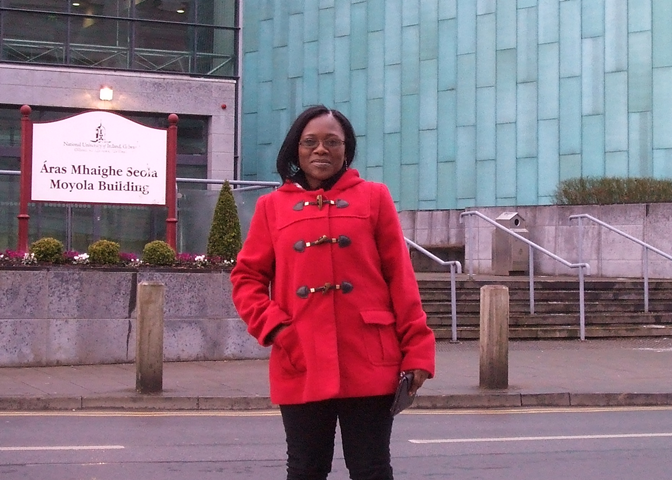Grace Namukonde
MA in Gender, Globalisation and Rights, NUI Galway
Grace worked with one of of Irish Aid's partner NGOs in Zambia in 2011 when she applied for an Irish Aid Fellowship. She was supported to undertake a Masters programme at the National University of Ireland, Galway in 2012-13, taking study leave from her role to pursue the course.

What I’ve found from being here is that we have gender issues that we see but we don’t have a deep understanding of. So it’s helping me to see where I can go back and improve things in terms of mainstreaming gender in my programme and also in terms of teaching people on human rights, children’s rights.
My name is Grace Namukonde. I work for CAMFED – the Campaign for Female Education. When I was awarded the Irish Aid Fellowship I was Senior Programme Officer in the Education Unit. One of my roles was managing the education programme - ensuring that funds were sent to the schools to support the vulnerable children, getting progress in terms of girls' performance, the school infrastructure, the training of teachers in psycho-social care and support. I was also in charge of running the child protection programme which is funded by Irish Aid, which is done at school level and also through training staff in the Ministry of Education.
I picked out the Masters in Gender, Globalisation and Rights because I felt it would give me experience and understanding for my work. What I've found from being here is that we have gender issues that we see but we don’t have a deep understanding of. So it's helping me to see where I can go back and improve things in terms of mainstreaming gender in my programme and also in terms of teaching people on human rights, children's rights. It's not something far from what I'm doing but something that will help me improve and help make our programmes gender sensitive. It has been the perfect choice for me.
One of the things I’ve benefitted from is an improvement in my analytical skills. Academic writing is different here from the structure we have back home and in learning the standards and expectations you also gain analytical skills. Also, participation in class is different. I'm a person who doesn't talk so much and I listen more, but in classes it's mandatory to discuss. There are readings every week and you have to participate in class discussion, sometimes lead discussion and pose questions. So I’m proud to say I can now engage without feeling intimidated or shy, I feel free to be myself and to speak out my mind. That is a big plus at an individual level and it will be different now when I go back. I think I will be a better manager.
We're a donor funded organisation so we are regularly writing proposals and reports and I think I will be able to be more effective in that area and more confident to speak about our work with key people.
Returning as a gender specialist, I'll be able to train staff to be able to understand how to mainstream gender in our programmes and also take that into our networks and policy advocacy.
Irish Aid is not just funding our child protection activities but also supporting our work through the Education Programme in over 40 schools, the SafeNet programme to try and stop boys and girls dropping out of school and other capacity building programmes. Irish Aid is a big donor for us and we’ve seen a lot of lives being changed through such funding.